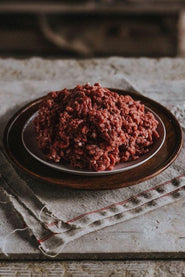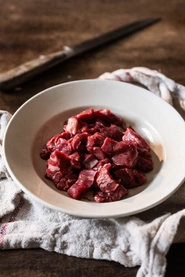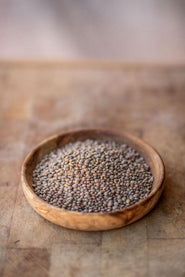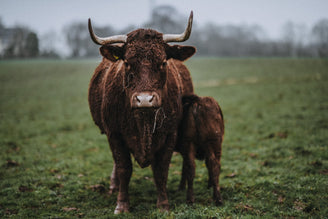Lizzie Rivera is the founder of the ethical lifestyle community; Live Frankly and a highly respected investigative journalist and writer for The Evening Standard and The Independent. We asked Lizzie one of the most controversial questions around eating in the last decade; meat eating vs vegan, is it time to change the debate?
Carnivore vs Vegan
The meat-eating vs vegan debate has hit the headlines again thanks to upcoming Sir David Attenbrough’s documentary A Life On Our Planet.
Of course, while the headlines shout that Britain’s beloved wildlife presenter is urging everyone to go vegetarian to save the plant, what Attenborough is actually reported to say is more nuanced:
“We must change our diet. The planet can’t support billions of meat-eaters… If we had a mostly plant-based diet we could increase the yield of the land.”
Mostly being a crucial word here.
Increasing the yield of the land being another important concept.
Covid-19 has made many of us reassess how we live our lives. Nearly two-thirds (63%) agree that we have a good opportunity to take a post-pandemic pledge to reduce our environmental impact on the world, according to a recent YouGov survey. They also report for almost a third of people (29%) that means enjoying more local produce.
As someone who is aligned with both of these intentions, the more I research the more one thing becomes crystal clear – the way food is produced is the most important thing. And I’m optimistic that this is an area where all of us trying to eat ‘better’ can align.
The tribal lines should not be drawn between vegans, vegetarians or flexitarian. That division predominantly serves to distract us from the most important objective: producing healthier, more nutritious (and better-tasting) food, farmed in tune with nature – and ending the era of industrial farming. Including getting animals out of factory farms.

Industrialised Meat and Industrialised Plant Based Food
The pandemic has further highlighted what those of you reading this probably already know: our industrialised food system is broken, especially when it comes to meat.
Scientists warn that intensive animal farming systems increase the risk of infectious disease, which is why an estimated 73% of all antibiotics used worldwide are for livestock.
Then there’s the fact that meat factories across the world, including England and Wales, became hubs for outbreaks of coronavirus as low-paid workers were forced to work closely to one another for long periods of time with reportedly minimal safety precautions. As one headline starkly put it: “A terrible way to go for £9 an hour”.
The pursuit of large industrial farms and processing plants has been proven not to be an efficient way to ‘feed the world’, after all. There’s little efficiency – or food security – in razing rainforests to grow soy to feed livestock halfway across the world. Livestock which are then unnecessarily transported hundreds of miles to abattoirs only for the meat to be sent back again to be sold to the local community where it was raised.
I won’t go into the horrendous conditions of factory farming for animals in this article, although I urge you to read this article: “15 years undercover on the trail of the global meat industry”. As an antidote to this article, I also recommend you read about the lives of pastured pigs and properly free-range chickens.
But, this doesn’t mean an industrialised vegan food system, co-opted by venture capitalists, is the silver bullet for the planet it promises to be, either.
In a move criticised by its former fans, the highly popular milk-alternative brand Oatly, has recently taken investment from the fund Blackstone, reportedly linked to funding deforestation of the Amazon. Oatly says global capital needs to be directed towards more sustainable investments, but critics argue if you purchase Oatly that’s where your money could be heading.
Key ingredients in vegan foods, such as soy, often come from monoculture farms where huge swathes of land are sprayed with herbicides and insecticides, which is devastating for biodiversity, the planet, the farmer and their family – and, ultimately, our health.
Similarly, popular vegan foods that don’t contain animal products but do contain palm oil, like the almighty Oreo, are likely to have contributed to the deforestation of the rainforest, the plight of the orangutans and, most likely, the poorly-rewarded farmers.
My point is, intensive animal agriculture and intensively farmed vegan products are not so much polar opposite food systems, but two sides of very similar extractive thinking.
If we want to protect the environment and animals, we need to protect our habitats. Whether we’re vegan, veggie or flexi we still need to consider where our food is coming from – who is farming, how and at what cost.

Farming in Tune with Nature
The conversation can no longer be about which method of farming does the least harm. It fundamentally needs to shift to how we can do the most good.
This is where increasing the yield of the land comes in, and the move towards regenerative agriculture changes the argument. It’s not a new idea – Pipers Farm have long aligned themselves with these principles – but it’s becoming more widespread.
Regenerative farming revolves around the symbiotic relationship between plant and animal farming. Its goal is not only to stop more harm being caused. But to actually reverse it.
The basis of the idea is to focus on improving soil health. Did you know in one teaspoon of fertile soil there are up to nine billion microorganisms? Crudely speaking, biodiversity above the ground leads to soil that is teaming with life and this leads to healthier plants and more nutritious food.
Biodiversity means plants and animals. Beef especially gets a bashing when it comes to the big meat vs. environment debate. However in the UK, there is mounting evidence to suggest farming with ruminant animals can have positive effects on climate change as grazing animals help to fertilise the land, remove carbon from the atmosphere and store it in soil. (The rumours that Pipers Farm co-founder Peter Greig carries a cow-pat around with him when talking about farming are true).
In a country where two-thirds of our land is grassland, rearing cows and sheep on solely pasture could make sense as part of a wider ecosystem.
More than this, it has been proved that small farms can pack a big punch. While research in this area is still fairly new, a study on French farm Bec Hellouin revealed that just 1,000 square meters of the most heavily hand-farmed land on their (biodiverse) farm produces as much as 10,000 square meters of (monoculture) land farmed with a tractor.
This is game-changing because it means we don’t have to choose between feeding the world, protecting the environment, and treating animals humanely because the three can go hand-in-hand.
So, why not also change the debate? Rather than labelling ourselves meat-eating or vegan, let’s label food ‘industrial’ or ‘regenerative’. It feels a much more honest way of protecting life on our planet.
Lizzie Rivera is founder of the genuinely good lifestyle directory Live Frankly






